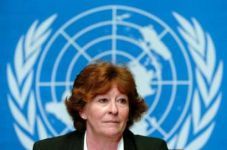UN rights officials say Sudanese govt’s efforts in Darfur inadequate
By TAREK EL-TABLAWY, Associated Press Writer
UNITED NATIONS, Sep 30, 2004 (AP) — Two top United Nations human rights officials on Thursday stopped short of classifying the situation in Sudan’s western Darfur region as a genocide, but said that crimes against humanity and war crimes have “probably occurred on a large and systematic scale.”
 Moreover, the “climate of impunity” in the conflict-wracked region is such that “we have not turned the corner on preventing genocide from happening in the future, or even in the near future,” U.N. Special Adviser on the Prevention of Genocide, Juan Mendez, told reporters after briefing the U.N. Security Council.
Moreover, the “climate of impunity” in the conflict-wracked region is such that “we have not turned the corner on preventing genocide from happening in the future, or even in the near future,” U.N. Special Adviser on the Prevention of Genocide, Juan Mendez, told reporters after briefing the U.N. Security Council.
U.N. High Commissioner for Human Rights Louise Arbour [photo] presented council members with several recommendations, including the need to deploy international police to aid Sudanese police stationed at refugee camps in Darfur.
The deployment of Sudanese police, she said, has done little to restore the faith of the 1.2 million Sudanese displaced by the fighting in the region and is contributing to the “climate of impunity reigning in Darfur today.”
“A mere increase in their numbers is unlikely to restore the lack of faith … and overcome the sense of insecurity and fear that is prevalent” in the refugee camps, Arbour said.
“It would seem that the only way to reverse that lack of trust would be to accompany the Sudanese police force with an international component in the discharge of their work,” she told reporters.
Her recommendations were presented ahead of a Security Council meeting later Thursday with the Sudanese foreign minister, a meeting which he requested.
Arbour told the council that a key challenge confronting security and aid to the region is “an alarming disconnect between the (Sudanese) government’s perception — or at least its portrayal — of what is happening in Darfur and the assessment of that situation by almost everyone else.”
The government “continues to convey neither a sense of urgency nor an acknowledgment of the magnitude of the human rights crisis in Darfur,” she said.
Arbour also highlighted other recommendations, which included boosting the international presence in Darfur and putting an end to the government practice of forcing refugees to return, especially as many of the areas have not yet been secured.
The council on Sept. 18 passed a resolution calling for the creation of an international commission to investigate claims of genocide in Darfur.
It also gave the thumbs-up for a significantly expanded African Union force in Darfur, and threatened sanctions against the Khartoum government if it doesn’t act to rein in Arab militias blamed for killing over 50,000 people and forcing 1.2 million to flee their homes.
Last week, Nigerian President Olusegun Obasanjo, who heads the African Union, said the 53-nation body can quickly mobilize up to 5,000 troops to help end the looting and killing in Darfur but it needs hundreds of millions of dollars to deploy the force.
The AU currently has about 80 military observers in Darfur — a region about the size of France — protected by just over 300 soldiers, monitoring a rarely observed cease-fire signed in April by the government and rebels.
Arbour also recommended a significant expansion of the AU force and called for a broadened mandate “to permit them perhaps to take on this international police function and also to address violations of human rights and international humanitarian law.”
She told the council the AU is “doing an excellent job in Darfur,” and later added to reporters that its presence could well be the “winning formula there.”
The conflict began when two Darfur rebel groups with roots in the region’s ethnic African tribes rose up in February 2003, accusing the Arab-dominated government in Khartoum of neglect and discrimination. The government is accused of trying to suppress the rebellion by backing ethnic Arab herdsmen known as Janjaweed — an allegation it denies.
Mendez described the Khartoum government’s security situation and efforts to deal with human rights and international law violations as “either inadequate or inept.”
Pressed on why he stopped short of declaring the situation in Darfur a genocide, Mendez said that determination would be tackled by an international commission which Secretary-General Kofi Annan is expected to appoint shortly.
He said his mandate was “about how to prevent the situation from degenerating into genocide.”
“Whether we think that it has happened already or not, it can still happen, or it can happen again, depending on your position,” he said, in response to whether there were any similarities between Darfur and the Rwandan genocide in 1994.
Mendez added that while there were some similarities, the situations were not comparable.
Still, he said, “it’s important to learn the lesson of Rwanda.”
The United States has classified the conflict in Sudan as a genocide while the United Nations has described it as the world’s worst humanitarian crisis.
